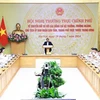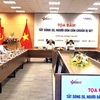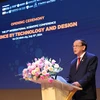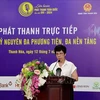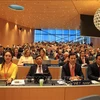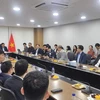 A staff from Hai Phong Paint JSC researches a new green product as part of a project under the first phase of Finland-Vietnam Innovation Partnership Programme. (Photo: VNA)
A staff from Hai Phong Paint JSC researches a new green product as part of a project under the first phase of Finland-Vietnam Innovation Partnership Programme. (Photo: VNA) The management board of the Finland-Vietnam Innovation Partnership Programme (IPP) stage two held a conference in Hanoi on October 1 to collect opinions on the future strategy of the programme.
According to Deputy Minister of Science and Technology Tran Quoc Khanh, creative innovation is an area that has drawn the attention of the Vietnamese Government.
In 2015, Vietnam rose to 52 nd from 76 th position in 2013 over 141 countries in the world in terms of its creative innovation level, he noted, adding that in Southeast Asia, Vietnam surpassed Thailand and follows only Singapore and Malaysia.
Marita Meranto from Finland’s Foreign Ministry said Vietnam and Finland are enjoying cooperation advantages as an ASEAN Community will be formed at the year’s end and negotiations for the Trans-Pacific Partnership are concluding.
The Vietnam-EU free trade agreement, which is expected to be signed soon, will pave the way for economic partnerships between Vietnam and the EU as well as Finland in particular, she said.
Meranto also pointed out that mobilising capital resources for creative innovation is challenging many developing countries, adding that Finland commits to continuing to support Vietnam in the field.
Meanwhile, Marko Saarinen, Finnish Counsellor in Vietnam, highlighted cooperation prospects between the two countries, especially in developing a national creativity system in Vietnam.
Finland will share its experience with Vietnam in the name of strengthened knowledge and trade exchanges between the two countries, he said. Through the IPP, Vietnam has supported enterprises to enhance creative innovation in production, but there are still significant gaps to address in order to improve the national system of innovation and upgrade the application scale in the private sector, added Saarinen.
He held that the private sector serves as a driving force for national creative innovation and therefore, increased creative innovation within the sector would contribute to boosting the economy and improving local living standards.
The IPP has served as an important tool for the transformation of bilateral cooperation from official development assistance to trade and knowledge-based affiliation, he added.
The IPP stage two will span from 2016 to 2018 with the expected expansion of 15 projects and the renovation of universities.-VNA



